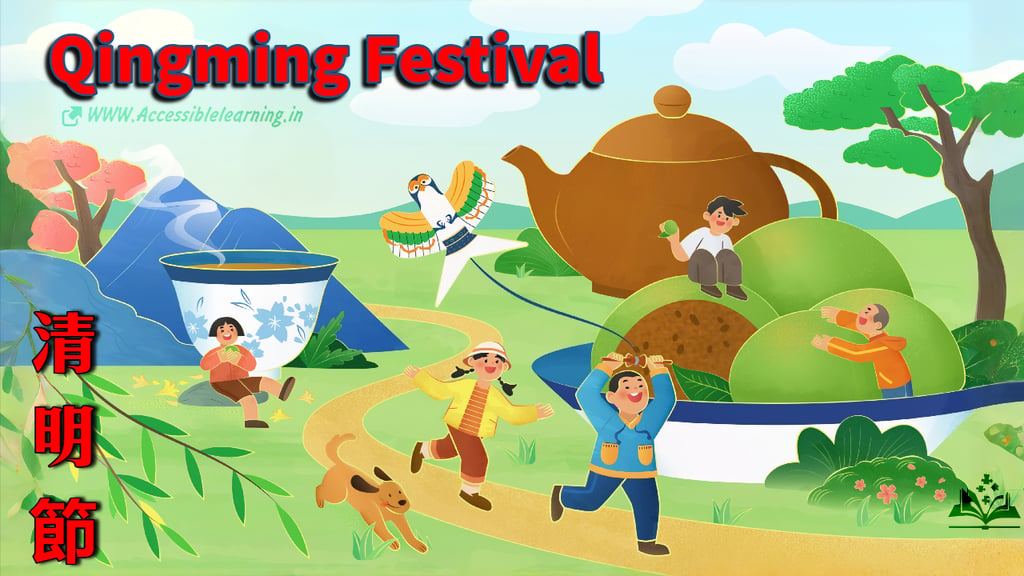
Qingming Festival: Honoring Ancestors and Embracing Spring
The Qingming Festival, also known as Tomb-Sweeping Day, is a significant Chinese tradition that blends ancestral remembrance with spring renewal. This festival, observed on April 4th or 5th, involves tomb-sweeping, kite flying, spring outings, and traditional foods. Learn about its rich history, customs, and modern adaptations, and discover how Qingming continues to connect generations while embracing environmental sustainability.
CULTURE/TRADITIONEVENT/SPECIALCHINACELEBRATION/FESTIVALS
Kim Shin
4/3/20253 min read


The Qingming Festival, also known as Tomb-Sweeping Day, is one of China’s most significant traditional holidays. It is a time dedicated to honoring ancestors, reflecting on family heritage, and embracing the renewal of spring. Celebrated on April 4th or 5th, Qingming (meaning "clear and bright") marks both a solemn and vibrant occasion, blending reverence with outdoor enjoyment. This festival, rich in history and cultural significance, continues to be an essential part of Chinese life.
Origins and Historical Significance
The origins of the Qingming Festival trace back over 2,500 years to the Zhou Dynasty. It is believed to have evolved from the ancient Hanshi Festival, a commemoration of Jie Zitui, a loyal court official who died in exile. The legend states that Emperor Wen of Jin ordered the festival to be observed in his memory. Over time, it merged with the custom of tomb-sweeping, solidifying its place in Chinese traditions.
By the Tang Dynasty (618–907 AD), Qingming had become an official holiday, with families paying respects to their ancestors by cleaning tombs, making offerings, and praying for blessings. Today, it remains a crucial festival in China, Taiwan, Hong Kong, and even among Chinese communities worldwide.


Traditions and Customs
The Qingming Festival is a day of both remembrance and renewal. Families engage in several traditional customs that highlight the balance between honoring the past and celebrating life.
Tomb-Sweeping (扫墓, Sǎo Mù)
At the heart of Qingming lies the practice of tomb-sweeping, where families visit the gravesites of ancestors. This involves:
Cleaning the tombstone and removing weeds.
Offering food, tea, and symbolic items such as paper money (joss paper).
Burning incense and bowing in prayer as a sign of respect.
Some families plant fresh flowers or new trees near the graves as a gesture of renewal.
Flying Kites (放风筝, Fàng Fēngzhēng)
A lighter and more joyful part of Qingming is kite flying. People believe that flying kites during Qingming helps send away bad luck and bring good fortune. Some even attach lanterns to their kites at night, creating a mesmerizing sky full of glowing lights.
Eating Qingming Festival Foods
Food plays an essential role in any Chinese festival. During Qingming, some of the notable foods include:
Qingtuan (青团)—Sticky rice balls filled with sweet bean paste, made from glutinous rice and mugwort, symbolizing spring.
Cold food (寒食, Hánshí)—Traditionally, people avoided using fire during the festival, eating cold dishes instead. Although this practice has faded, cold foods such as pickled vegetables and steamed buns remain popular.
Spring pancakes—Thin pancakes filled with fresh vegetables, symbolizing the freshness of spring.
Spring Outings (踏青, Tà Qīng)
Qingming also celebrates nature’s beauty, encouraging families to go for spring outings, or "踏青 (tà qīng)." This is an opportunity to appreciate blooming flowers, fresh air, and reconnect with nature, reinforcing the theme of renewal. Many people take part in outdoor activities such as hiking, picnicking, and enjoying the scenery of willow trees and blossoming flowers.
Worshiping Earth Gods
Apart from honoring ancestors, some families also pay respects to local Earth Gods, who are believed to protect the land and bring agricultural prosperity. Offerings such as fruits, grains, and wine are made to seek blessings for a fruitful harvest.
Burning Paper Replicas
A unique tradition during Qingming is the burning of paper replicas of everyday items, such as houses, cars, and even smartphones. It is believed that these items will be delivered to ancestors in the afterlife, ensuring their comfort and well-being.
Modern Adaptations and Global Influence
As time progresses, Qingming traditions have evolved. With urbanization, some families now pay respects online through virtual tomb-sweeping services. In Taiwan, high-tech memorial halls allow people to make digital offerings, while in some parts of China, drones are used to drop paper money over grave sites.
Outside China, countries such as Malaysia, Singapore, and Indonesia, where large Chinese communities reside, also observe Qingming. Despite geographical differences, the essence of the festival—honoring one’s ancestors and embracing spring—remains the same.
Cultural and Philosophical Reflections
Qingming is deeply rooted in Confucian and Taoist philosophies, emphasizing filial piety, respect for the deceased, and harmony with nature. It serves as a reminder that while we cherish the past, we must also embrace the present and future.
Environmental Awareness and Qingming Festival
In recent years, eco-friendly practices have been encouraged during Qingming. Many people are opting for biodegradable offerings, digital incense, and tree-planting activities instead of traditional paper burning. This shift aligns with growing environmental awareness, ensuring that customs remain sustainable for future generations.
The Qingming Festival is more than just a day of mourning—it is a celebration of life, family, and nature. By paying tribute to ancestors and welcoming the vitality of spring, Qingming harmonizes remembrance with renewal, making it one of the most meaningful and enduring traditions in Chinese culture. Whether through traditional tomb-sweeping or modern digital commemorations, the spirit of Qingming continues to connect generations across time, ensuring that history, heritage, and love for family remain alive.
Subscribe To Our Newsletter
All © Copyright reserved by Accessible-Learning Hub
| Terms & Conditions
Knowledge is power. Learn with Us. 📚


